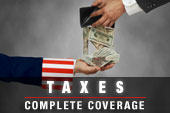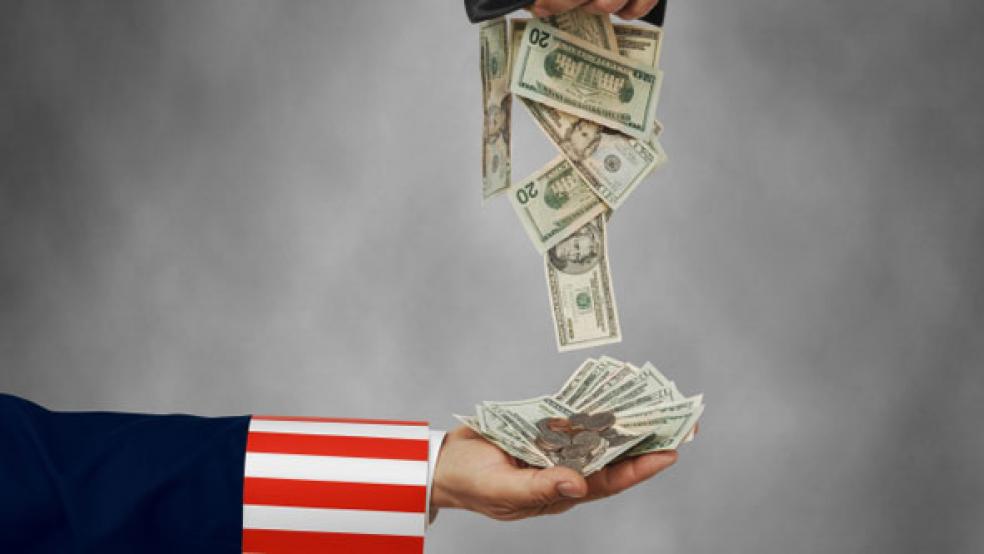If the lame duck Congress and President Obama drive over the fiscal cliff on New Year’s eve without passing new tax legislation or extending a host of expiring tax breaks, the average American household would get slapped with a $3,500 tax hike next year, according to a new analysis from the Tax Policy Center. Nearly 7 out of every 8 households will pay higher taxes.

Allowing the tax breaks to expire would theoretically raise $536 billion for the federal government next year, the analysis said, which is sharply higher than Congressional Budget Office projections that only looked at the fiscal year that began Monday. However, most economists believe a fiscal shock of that magnitude would immediately throw the economy into recession, which would sharply reduce actual collections.
No class of Americans would be exempt from so-called Taxmageddon except for the elderly who have no other income besides Social Security. Even the bottom fifth of earners – those whose tax returns report less than $20,113 a year – will get slapped with an average tax hike of $412. The two percentage-point payroll tax break, the earned income tax credit and the childcare tax credit will expire on January 1, 2013.
And for those in the upper half of the income distribution, the news is even grimmer. Indeed, the more one earns, the more one will pay in increased taxes, the TPC analysis showed. Households earning between $108,266 and $143,373 will pay an extra $6,359 in taxes next year. Nearly one of every four dollars they earn will go to the federal government, up from less than one in five now.
The top one percent of earnings – those earning over a half million dollars annually – will see their taxes rise on average by $120,537. However, that average is skewed by the extremely high earnings in the top one-tenth of one percent. The super rich, the top one-tenth of one percent earning over $2.66 million a year, will pay on average an additional $633,946 in taxes because of expiring reductions on long-term capital gains, dividends, estate tax reductions and the high end of the Bush-era tax cuts.
Taxmageddon! | |||
| Income | Average Tax Hike | ||
| Below $20,113 | $412 | ||
| $20,114 - $39,790 | $1,231 | ||
| $39,791 - $64,484 | $1,984 | ||
| $64,485 – 108,266 | $3,540 | ||
| $108,267 - $143,373 | $6,359 | ||
| $143,374 – $204,296 | $8,271 | ||
| $204,296 - $506,210 | $14,871 | ||
| $506,211 and Above | $120,537 | ||
| Household Average | $3,446 | ||
| Source: Tax Policy Center | |||
Other tax provisions expiring at the end of the year include the middle-class tax breaks, the alternative minimum tax and the so-called tax extenders, which include deductibility of state and local sales taxes, education credits and numerous business deductions and credits.
“For a government that raises about $2.5 trillion a year in revenue now, this would be a very large tax increase – about 20 percent or more,” said Donald Marron, director of the Tax Policy Center, which is a joint venture between the Urban Institute and the Brookings Institution.
When asked if there was anything surprising about the findings, co-author Eric Toder, a senior fellow at the Urban Institute, said “part of the surprise to me was how big the tax increase was. It’s just a huge, huge number.”
Despite the magnitude of the tax hike, the study authors said it would only increase the total federal tax take to a shade over 18 percent of gross domestic product, which is about what the government averaged in taxes for most of the past half century. Tax collections are currently running at less than 16 percent of GDP.
In responding to the Great Recession, politicians have largely relied on tax cuts to spur economic growth. The resulting reductions in revenue account for about half of the yawning federal deficit of more than $1 trillion a year.
However, there’s no guarantee that allowing all the tax cuts to expire would have anywhere near the expected impact on reducing federal deficits. Most economists say allowing all the tax breaks to expire next year will throw the economy into a double-dip recession, which would push up counter-cyclical spending on the unemployed and reduce tax collections because fewer people would be working.
At least some of the tax hikes are likely to expire. Political leaders on Capitol Hill from both sides of the aisle are saying the payroll tax cut will expire. Most Americans never noticed the cut, according to public opinion polls. That would raise $115 billion in additional revenue next year, the TPC analysis said.
The largest amount of revenue would come from restoring the Clinton-era tax rates. Failure to renew the high-end reduction, which President Obama has repeatedly said he won’t sign if it is passed, would raise about $44 billion. Allowing the middle-class portion of the Bush-era tax cuts to expire will raise $171 billion next year, according to TPC.
Failure to renew the earned income tax credit (EITC), the child tax credit and education tax credits, which are disproportionately used by low-income households, will only raise $27 billion. But it will hammer each household who benefits from those programs at levels comparable to people who make a lot more money.
Just 22.4 percent of households in the bottom fifth of the income distribution make use of the EITC and other credits, the TPC analysis showed. Allowing those programs to expire along with the payroll tax reduction would increase taxes for that group by an average of $1,126 next year, which is nearly as much as people earning twice their salaries.





